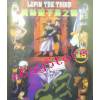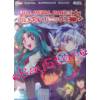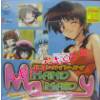
Japan Anime
| Price : | |
| Weight : | 250 g |
| Genre : | Boy Series Animation , |
| Subtitle : | Chinese , English , |
| Language : | Japanese , |
| Video Format : | NTSC , |
| Discs : | 2 |
| Region Code : | ALL , |
| Model : | Complete Set , DVD9 , |
“ 闇に惑いし哀れな影よ・・・ 人を傷つけ貶めて、罪に溺れし業の魂 ・・・ いっぺん、死んで見る?
"O Pitiful shadow cloaked in darkness. Thy actions cause men pain and suffering. Thy hollow soul drowns in thy sins. I will show you what death is."
”
— Enma Ai.
Each short story of which the series consists describes the suffering of a different individual caused by one or more antagonists. A website known as Jigoku Tsūshin (Hell Correspondence) may only be accessed at midnight by one who harbors a desire for revenge against their tormentor. Should someone submit the name of one they hate, the Jigoku Shōjo (Hell Girl) will offer them a black straw doll (first season; in the following season the doll may be either red, blue or black) with a red string wound about its neck. If the string is pulled, she will ferry the recipient of the revenge straightaway to Hell, but on the condition that those who request her intervention fall into Hell as well at the end of their natural lives.
During each story, the protagonists' dramas are explained in detail from the start of their grudges, through the escalation of their torment until it becomes unbearable and they resort to the "Jigoku Tsūshin" (correspondence with Hell) - a mysterious black-colored website only accessible at midnight. The contents of the site are only a text: "あなたの怨み、晴らします。 (We will take revenge on your behalf.)", a text box where the grudge's object must be written, and a "送信 (Send)" button. Some time after the post, they are visited by Enma Ai, a young red-eyed girl wearing a traditional sailor school uniform. She delivers them a black straw doll (In the second season, the doll may also be red or dark blue, depending on who turns into it) with a red string tied to its neck, and she tells them that if they want their vengeance to be delivered, they must remove the string from the doll, and their enemies will be immediately taken to Hell. However, a crest-shaped mark will appear on the protagonists' chests, always reminding them that after their lives come to an end, they must give compensation by having their own souls also sent to Hell.
Enma Ai lives in a house in an unknown world that is in eternal sunset with her grandmother whose face never appears. Ai is helped by her three assistants. When they are not under her services, they stay in the form of three straw dolls, otherwise they assume the form of Ichimoku Ren, a handsome young man in casual clothes and takes the form of the blue straw doll, Hone-Onna, a beautiful woman wearing a kimono with the obi (sash) tied in front which signifies she is a prostitute and takes the form of the red straw doll; and Wanyūdō, an old man wearing a hat and a red scarf, who takes the form of the black straw doll. They help her during the event when their victims are confronted with their own sins, prior to the moment when Ai (dressed in traditional kimono with floral patterns) ferries them to hell. Also, the trio helps her investigate the true nature of their clients.
In episode 8 of the series, two recurring characters are introduced: A journalist named Shibata Hajime - a former scandal-hunter/blackmailer who turned to investigating the stories involving the Jigoku Shōjo; and his daughter Tsugumi. After an encounter with Enma Ai, Tsugumi starts to have visions of what Ai sees and thus the two become more and more involved in Ai's matters. Hajime doesn't agree with Ai's methods to deliver vengeance for her clients, and tries to stop those who contacted Jigoku Shōjo from using her service with Tsugumi's help.
As the series progressed, it was revealed that Hajime and Tsugumi were the descendants of a man named Sentarō Shibata. Sentaro and Ai are childhood friends as well as cousins. The village they lived in had a tradition: Every seven years, a seven year-old child would be sacrificed to the gods, allowing for seven more years of prosperity. Ai was chosen as the sacrifice, but her parents asked Sentaro to hide Ai rather than leave her to be sacrificed. Sentaro agrees, and takes her up to the mountain, keeping her hidden for six years. However, the village also experiences a great famine.
During one of Ai and Sentarō's secret meetings, the villagers catch them and bring them to the village, where Ai and Sentarō are accused of angering the Mountain Gods. The villagers throw Ai and her parents in a pit and force Sentarō to bury them as an atonement for hiding Ai. Ai is conscious at the moment and feels betrayed by him.
After Ai was buried, Sentarō awakens one night and went out of his home. When he returns, he sees Ai setting the village on fire. Out of insanity and guilt, Sentarō runs away. He grew up regretting what he had done and builds a temple in remembrance of Ai and other sacrifices to the Mountain Gods. He opens a candy store named Shibataya that sells a black candy that he and his descendants and other owners of the store send to the temple as an offering.
The realization of Hajime and Tsugumi's relation to Sentarō awakes Ai's hatred, and she attempts to kill Hajime and Tsugumi, but fails. For doing so, Ai was to be sent to hell, but she escapes and decides to provoke Tsugumi into sending her father to hell by showing Tsugumi how her mother died and her father's denial of his responsibility, Ai keeps pressing Tsugumi to pull the string while Hajime is trapped in Ai's world, but is subsequently able to escape because of Ai's grandmother, who releases him for an exchange (whatever the exchange actually was never shown).
Hajime returns to Tsugumi and admits his faults, and tells Tsugumi to send him to hell. This angers Tsugumi because she feels that his acceptance of hell infers that he does not value their moments together. She returns the straw doll to Ai, and Ai later incinerates the temple built by Sentarō either as a way of relieving her grudge (in this case, the destruction of the temple would symbolize Sentarō's release from his regret) or as a sign that she would not forgive Sentarō, despite all that he did to show his regret (the destruction of the temple in this case would symbolize the refusal of Sentarō's apology). The season ends with Hajime and Tsugumi going back to normality and Ai continuing what she has been doing for centuries - sending people to hell.
Season 2 of Jigoku Shōjo (named Jigoku Shōjo Futakomori) started by revealing that Ai is to be punished by hell for the massacre of her village. If she refuses, her parents shall wander in darkness for eternity. It was known that her punishment is to deliver the vengeance of others.
In the beginning of season 2, there is a mysterious girl who shows up in glimpses during the first episode; she has a kimono similar to Ai's and seems to smile after the people who make the covenant review their situation, as in episode 1 where she appears just after Ai walks away. After episode 4, the girl's name is revealed to be Kikuri.
In season 2, the origins of Ai's assistants are revealed.
The major arc of season 2 revolves around Takuma Kurebayashi, a boy from Lovely Hills who is blamed by his townsfolk for causing disappearances around the town, which was actually caused by the townsfolk who used Jigoku Tsūshin. The unfair treatment received by Takuma from his townsfolk awoke Ai's memory of her own past, and she refuses a request to send Takuma to hell. By doing so, Ai has broken the law of Hell and her role as Jigoku Shōjo was relieved. Nonetheless, as she is relieved of her duty, she is returned to life by the cruel Lord of Hell and sent back to the real world in a near death situation, experiencing the agony of aging of 400 years all at once. Ren, Honne-Onna, and Wanyuudou tried to help the mortal Ai, only to discover that her memories of them have been erased by the Lord of Hell.
Ai tries to stop the villagers from killing Takuma and succeeds for a moment. However, a frightened user of the Jigoku Tsūshin, in hope of saving himself from going to hell when he dies, beats Ai in the back of her head with a shovel. A few other townsfolk of Lovely Hills, all whom have used her service, joins in with the assault in a fit of rage. As Ai succumbs to her death, she says, "This is the end," sounding relieved. She disappears into a wind of cherry blossom petals shortly after death, and her parents' souls are set free from Hell. Kikuri, on the boat to Hell, says as she pokes a cherry of the color of Ai's eyes in a childish way: "It's over. That was Ai's answer... Well done." The season ends. Ren, Onna, and Wanyūdō going their separate ways in the real world, Takuma's life returning to normality, and an anonymous girl receiving a message from Hell Girl on her cellphone.
Also of note is that the male narrator at the beginning of every episode is also the actor who portrayed Wanyuudo in the live-action adaptation.























